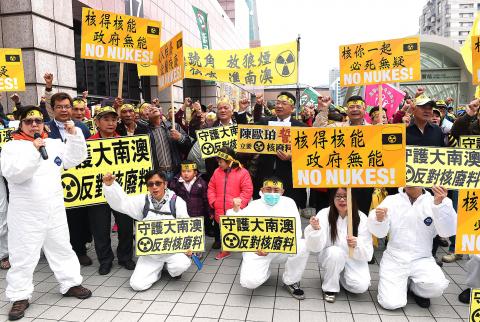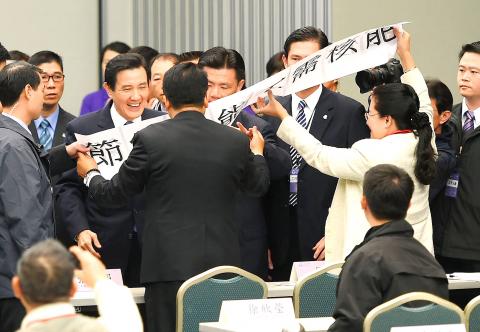Taiwan should not arbitrarily abandon any energy options if it does not want to suffer from electricity shortages, President Ma Ying-jeou (馬英九) told the National Energy Conference yesterday.
Addressing the two-day conference, which opened in Taipei yesterday, Ma agreed with calls for Taiwan to phase out nuclear power, but proposed doing so gradually and in a way that would not cause power shortages, increase electricity rates or violate the nation’s commitment to reducing carbon emissions.
“Since several coal-fired power plants are scheduled to be decommissioned in a matter of years, and the Fourth Nuclear Power Plant was designed to close the subsequent gap in energy, Taiwan could face electricity shortages or rationing in the near future,” he said.

Photo: Chang Chia-ming, Taipei Times
The right mix of energy sources for the nation’s energy requirements should be sufficient, affordable, sustainable, reliable and clean, he added.
Citing the results of evaluations conducted by the Intergovernmental Panel on Climate Change and the International Energy Agency last year, he said that nuclear energy is a mature baseload energy source with low greenhouse gas emissions, and that the proportion of nuclear power in the global energy supply will remain at roughly 12 percent until 2040.
Renewable energy sources, despite having been forecast to make the biggest leap by 2040 to make up 33 percent of overall supply, will be largely constituted by hydroelectric power, and the proportion made up of solar and wind energy will not be overwhelming, he said.

Photo: Chang Chia-ming, Taipei Times
Ma said he hoped the two-day event would “at least help to summarize objective facts” regarding the energy source options available to the nation, thereby helping parties with disparate views on Taiwan’s energy policies put aside their differences and arrive at a consensus.
After his opening remarks, Ma was met by Democratic Progressive Party legislators Chen Ou-po (陳歐珀) and Tien Chiu-chin (田秋堇) beside the stage, who held a banner that read: “Promote green energy and energy conservation. We don’t need nuclear power.”
Shortly before the conference, the duo led about 200 residents from Yilan County’s Dananao area (大南澳) in a protest outside the conference against what they said was a clandestine government plan to bury nuclear waste in their hometown.
Chen said that the Bureau of Energy and the Atomic Energy Council had secretly established an underground laboratory designed to run analyses on the geology close to the border of Dananao and Hualien County’s Sioulin Township (秀林) — a plot known as “Area 146” — as part of the government’s plan to store more than 20,000 highly radioactive spent fuel rods in the area.
Tien said the vast majority of Yilan residents have long opposed the use of nuclear energy, and disposing of nuclear waste in Dananao would be unfair to the Aboriginal people living there, as it would mar one of the nation’s most beautiful areas. The protest was comprised of a coalition of environmental protection groups, who criticized the government for its procrastination in developing renewable energy sources and refusing to set carbon reduction goals despite the Basic Environment Act (環境基本法) — enacted in 2002 — which clearly states that the government should implement plans to achieve the goal of a nuclear-free nation.
Green Citizens’ Action Alliance secretary-general Tsuei Su-hsin (崔愫欣) said that a draft bill for levying an energy tax to promote energy conservation was still an option, as the idea was included in the conclusions reached during the previous energy conference in 2005.
Citizen of the Earth, Taiwan director Tsai Chung-yueh (蔡中岳) panned what he said was the event organizers’ “authoritative” attitude toward the general public, saying they claimed that they would consider public opinion gathered during regional meetings, but arrived at the assembly without a solution.
Northern Coast Anti-Nuclear Action Alliance chairperson Hsu Fu-hsiung (許富雄) decried what he said was an opaque “black box” vetting process by the energy bureau in determining participants of the National Energy Conference, which had excluded him and many of his fellow anti-nuclear activists.

WAITING GAME: The US has so far only offered a ‘best rate tariff,’ which officials assume is about 15 percent, the same as Japan, a person familiar with the matter said Taiwan and the US have completed “technical consultations” regarding tariffs and a finalized rate is expected to be released soon, Executive Yuan spokeswoman Michelle Lee (李慧芝) told a news conference yesterday, as a 90-day pause on US President Donald Trump’s “reciprocal” tariffs is set to expire today. The two countries have reached a “certain degree of consensus” on issues such as tariffs, nontariff trade barriers, trade facilitation, supply chain resilience and economic security, Lee said. They also discussed opportunities for cooperation, investment and procurement, she said. A joint statement is still being negotiated and would be released once the US government has made

NEW GEAR: On top of the new Tien Kung IV air defense missiles, the military is expected to place orders for a new combat vehicle next year for delivery in 2028 Mass production of Tien Kung IV (Sky Bow IV) missiles is expected to start next year, with plans to order 122 pods, the Ministry of National Defense’s (MND) latest list of regulated military material showed. The document said that the armed forces would obtain 46 pods of the air defense missiles next year and 76 pods the year after that. The Tien Kung IV is designed to intercept cruise missiles and ballistic missiles to an altitude of 70km, compared with the 60km maximum altitude achieved by the Missile Segment Enhancement variant of PAC-3 systems. A defense source said yesterday that the number of

Taiwanese exports to the US are to be subject to a 20 percent tariff starting on Thursday next week, according to an executive order signed by US President Donald Trump yesterday. The 20 percent levy was the same as the tariffs imposed on Vietnam, Sri Lanka and Bangladesh by Trump. It was higher than the tariffs imposed on Japan, South Korea and the EU (15 percent), as well as those on the Philippines (19 percent). A Taiwan official with knowledge of the matter said it is a "phased" tariff rate, and negotiations would continue. "Once negotiations conclude, Taiwan will obtain a better

FLOOD RECOVERY: “Post-Typhoon Danas reconstruction special act” is expected to be approved on Thursday, the premier said, adding the flood control in affected areas would be prioritized About 200cm of rainfall fell in parts of southern Taiwan from Monday last week to 9am yesterday, the Central Weather Administration (CWA) said. Kaohsiung’s Taoyuan District (桃源) saw total rainfall of 2,205mm, while Pingtung County’s Sandimen Township (三地門) had 2,060.5mm and Tainan’s Nanhua District (南化) 1,833mm, according to CWA data. Meanwhile, Alishan (阿里山) in Chiayi County saw 1,688mm of accumulated rain and Yunlin County’s Caoling (草嶺) had 1,025mm. The Pingtung County Government said that 831 local residents have been pre-emptively evacuated from mountainous areas. A total of 576 are staying with relatives in low-lying areas, while the other 255 are in shelters. CWA forecaster